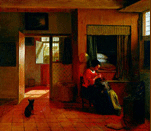










11.
Women’s Sense of Space in the
Age of European Overseas Expansion
Organizers:
Description:
Format: Using no more than three slides (including Jan van
der Straet’s “America”), we will begin with visual representations
of the myth of the New World as a land of male conquest and female submission.
We will also briefly discuss how the excerpts from Cavendish’s and Graffigny’s
work fit into their work as a whole and how they respond to other writers.
This introductory session will last no more than 20 minutes. The remaining
70 minutes will be devoted to a group discussion of the texts and images.
Because the reading list is by no means exhaustive, we will encourage workshop
participants to share their knowledge of other texts and images and how they
relate to the overall themes of the workshop. In the last 10 minutes, we hope
to focus on future areas for research.
Comparative, Interdisciplinary Focus: This workshop builds on skills drawn from various disciplines, including literary theory, art history, and social and cultural history. The texts chosen encourage participants to think across national boundaries; an English writer and a French writer are included among the readings, as well as an article by an Italian historian about the experiences of Venetian women in the new Atlantic economy. Since Italian language writings by women of this period are still being recovered, we do not know if Italian women directly addressed the issue of the New World in their writings. One of the goals of this workshop is to facilitate communication between scholars about women’s texts that deal with the New World. We hope that scholars familiar with women’s literature in Dutch, Portuguese, Spanish, German, and so forth will also be able to contribute to the comparative discussion. The interdisciplinary, comparative focus of the workshop is reflected in the disciplinary affiliations of the four conveners: English literature (Andrea), French literature (Wolfgang), and Italian history (Horodowich and McGough).
Relevance to Conference Themes and Plenary One, Geographies
and Polities: The workshop’s primary focus is an exploration
of how women imagined space during an era of expanding frontiers. Did the
idea of the New World allow women to redefine their relationship to the state
in which they lived? Did their writings challenge or reinforce the notion
that men are the makers of polities, and women their subjects? Did women embrace,
subvert, or ignore the idea of “empire?” What difference did nationality
make in the way that women imagined the New World (a useful contrast to Cavendish
and Graffigny is the Spanish writer Catalina de Erauso, whose New World experiences
were not imagined but quite literal)? How were women’s experiences shaped
by the economic changes of the Atlantic economy? When women described the
New World, did they primarily see it as a “market,” a “polity,”
or something entirely different? The questions this workshop addresses are
core issues defined for Plenary Session One, Geographies and Polities, as
well as the overall conference theme, Structures and Subjectivities.
We should emphasize that we see this workshop as exploratory, the beginning
of a conversation with workshop participants that we hope will extend beyond
the three-day conference. As mentioned beforehand, the work of recovering
female authors (and artists) is still going on in Italian literature, as it
is in Dutch, Portuguese, Spanish and German literature. We hope that the workshop
will serve as an impetus for scholars to continue the process of recovering
women’s texts and works of art and to look for writings and images that
may have addressed New World themes.
Originality: Workshop participants will explore the issue of space through the lens of the New World, which will enable participants to evaluate the relevance of polities, language, and cultural traditions in informing women’s sense of space and their subjectivity. Although the New World is a recognized theme in epics, primarily written by men, less attention has been paid to how women responded to European overseas expansion.
Preliminary List of Readings (30 minutes total):
Recommended:
|
|
|
||||||
|
|
 |
 |
|
||||
 |
|
 |
|
||||
|
|
|
||||||
|
|
|
||||||
 |
|
||||||
|
|
|
||||||
| |
|
||||||
 |
|
||||||
 |
|
||||||
 |
|
||||||
 |
|
||||||
|
|
|
||||||
|
|
 |
|
|
||||
 |
|
||||||
|
|
|
|
|
|
|
|
|